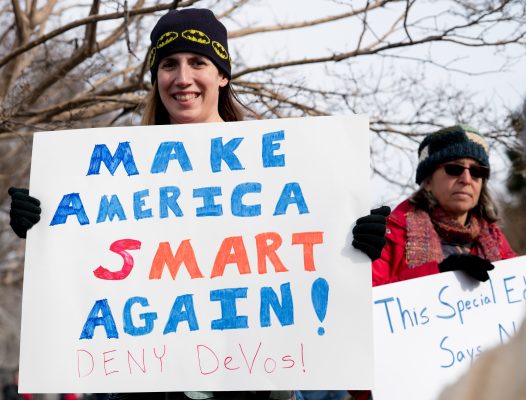DeVos Sparks Questions for Higher Ed
Victoria Pickering
Protestors have been demonstrating against the appointment of DeVos. (VICTORIA PICKERING / FLICKR)
February 24, 2017
Betsy DeVos was confirmed last week as President Donald Trump’s Secretary of Education, after a heated Senate exchange which ended with an unprecedented tie-breaking vote by Vice President Mike Pence. Her instatement will make her the direct liaison between the President and the department, which currently collects data and does research on student outcomes and successes, administers the Title I program for schools with high numbers of low-income students as well as federal postsecondary student aid. It also handles matters related to discrimination in schools and colleges by race, gender, sexual orientation and other characteristics.
In her previous career DeVos was the founder and chairwoman of the Windquest Group, which invests in technology, manufacturing and clean energy. She also is a chief investor in and board member of Neurocore, which offers biofeedback therapy for disorders including autism, but has not published its work in peer-reviewed medical literature. She has also been known for her advocacy of school choice, school voucher programs, private and charter schools, a greater influence of Christianity in education and the paring down of federal power in the education system, particularly K-12.
This interest in decreasing the department’s reach is not small: in an Axios interview on Feb. 17, DeVos said, “It would be fine with me to have myself worked out of a job, but I’m not sure that — I’m not sure that there will be a champion movement in Congress to do that.”
She will soon have the ability to change curricula. Congress’ upcoming reauthorization of the Higher Education Act will allow her to make changes to teacher preparation regulations, potentially changing how education students are trained, according to USA Today. This development might impact schools of education immediately or require further interpretation by the states.
During her confirmation hearing on Jan. 18, DeVos gave ambiguous answers to the few questions concerning her opinions on issues in higher education, the Washington Post reported. In an exchange with Sen. Elizabeth Warren (D-Mass.), she refused to either commit to or denounce enforcement of the “gainful employment” regulation, which threatens to withhold federal financial aid from career-training programs whose graduates fail to land jobs earning enough to repay their education loans. Congressional Republicans have voiced criticism for the rule, but DeVos did not indicate her opinion.
During the hearing she was also asked about her plans on possibly reducing student loan delinquencies, default and interest rates, or whether she plans to preserve the Direct Loan program or reinstate a private lender-funded federal student loan program, which existed up until 2010. U.S. News says that the credit requirement for private loans is much more stringent than for federal loan programs, which could lead to lower-income students being excluded from their college of choice.
Both a change in loan types available and requirements for private loans could have real impacts at Fordham, where 91 percent of students received aid which totaled $51.5 million in 2014-2015, including $2.4 million in federal grants, $7.3 million in federal student loans and $3.65 million in other loans, according to the National Center for Education Statistics.
“For too long a college degree has been pushed as the only avenue for a better life,” DeVos suggested in her remarks in support of vocational and technical education. It is not clear, however, how she might go about encouraging higher enrollment in these types of schools. The unemployment rate in 2015 for four-year college graduates age 25 and over was 2.8 percent (with a median usual weekly earning rate of $1,137), while the unemployment rates for those 25+ with only some college or a high school diploma were 5.0 percent ($738) and 5.4 percent ($678), respectively, according to the Bureau of Labor Statistics.
When Sen. Bernie Sanders (I-Vt.) asked whether she would work towards making public colleges and universities tuition-free, she responded, “There’s nothing in life that’s truly free, there’s somebody that’s going to pay for it,” before saying that she would work with Sanders to make sure that higher education is “affordable for all young people.”
The Washington Post has warned that a particularly significant power of the Secretary of Education is to direct federal policy on sexual assault in college. Under the Obama administration, the Department’s Office for Civil Rights (OCR) waged a six-year campaign against sexual assault and harassment on college campuses, prohibited under anti-discrimination law Title IX. The OCR’s urging of college officials to respond promptly to reports of sexual violence and use a standard of “preponderance of the evidence” when determining whether an assault occurred, however, has been criticized and used by Congress Republicans as an example of Obama’s overreach.
During DeVos’s hearing, she agreed that sexual assault “in any form or in any place is a problem,” but said it would be “premature” for her to agree or disagree with a commitment to uphold Obama’s Title IX guidance. “I look forward to understanding the past actions and current situations better and to ensuring that the intent of the law is actually carried out in a way that recognizes both the victim, the rights of the victims, as well as those who are accused,” she said.
Here at Fordham, Title IX, which encompasses sexual assault, harassment, violence, exploitation, discrimination and gender discrimination, is enforced by the Department of Public Safety, the dean of students and the Title IX coordinator, as well as staff from Residential Life, Health Services, Counseling Services and off-campus resources when appropriate.












